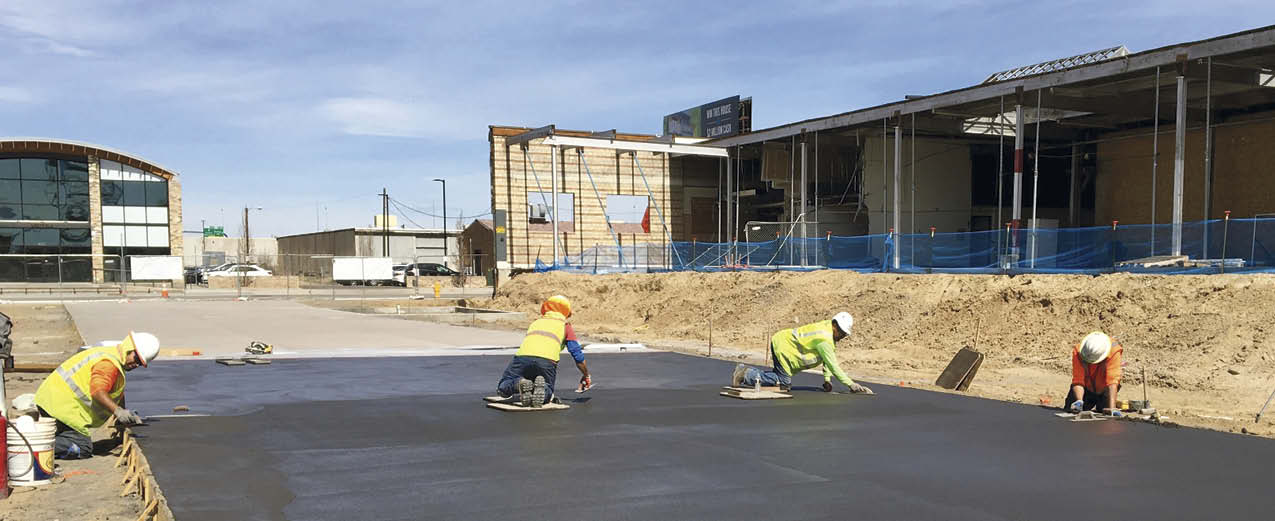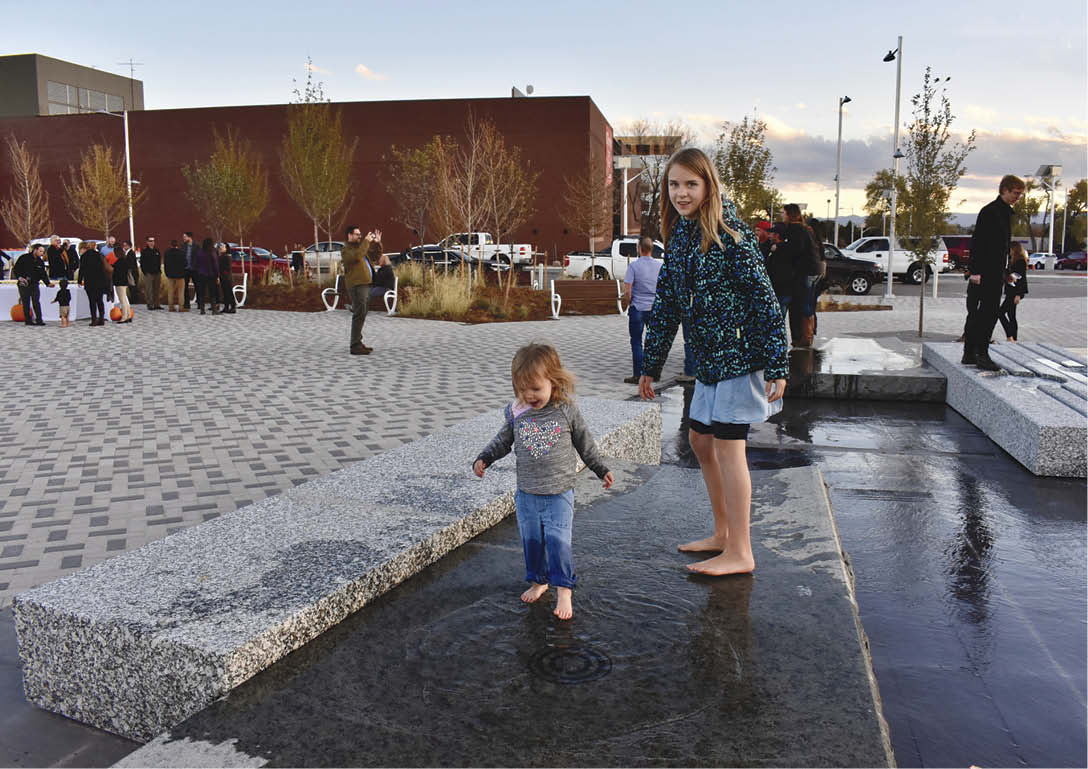
About a week after having my fourth child, I received several kind comments and gestures from people across our industry. But two in particular stuck out. The first involved a residential client and the second was from a commercial general contractor. The interactions made me ponder the pros and cons of commercial versus residential construction.
A residential review
When I was about eight months pregnant, I took on a small residential project, not because I like residential work, but because I had given a presentation to a group of landscape architects and one of them asked me to help out with mismatched concrete in a basement of one of his new-build residential projects.
Honestly, I cringed going into it. Throughout my career, I’ve been warned many times not to go “fix” other concrete contractor’s mistakes because it only leads to trouble. The concrete contractor who placed the basement floor did a great job. However, like in most construction, something got missed and additional plumbing had to be run through the floor. So, a portion of the floor was removed and replaced.
The floor was integrally colored, but the replaced section didn’t appear to be — or at least not at the same dosing. The architect called to see if we could help match it. Again, a cringe-worthy call. We all know two different loads of concrete rarely match, especially if one was an integrally colored short load. But, as a new business trying to create a name with the design community, I agreed to look at the floor.
Well … sure enough, the slabs weren’t even close, and I could see why they were concerned. But more importantly, I fell in love with the cute couple who loved concrete and design almost as much as I do. The homeowners’ personalities made me smile and want to help them. So, I agreed to do the job, which grew into a few others on the same property.
But, the initial portion of staining one slab to match the others, I took on myself … at eight months pregnant. I sat on the cold basement floor finessing colors and watching paint dry (literally) until the pour-back resembled the same color as the rest of the floor. I don’t know who was more surprised and relieved — me or the owners — but we were all happy to problem-solve together.
A real connection
What was most heartwarming to me is the homeowners insisted I bring Baby Boy to see them after he was born, which I did. The wife spoiled him with a very heartfelt gift. It’s those personal connections that make me appreciate residential construction.

That encounter that made me wonder if residential concrete work wasn’t as bad as I had believed all these years. With a great team in place, and reasonable/honest expectations set upfront, it can be very rewarding to help problem-solve with the end user.
A commercial connection
The second scenario was similar, and maybe not quite as personal, but still it has to do with the connections in our industry. This year we won our largest contract to-date with a newer general contractor. Winning the project surprised me, and I wanted to make sure we gave them the attention they deserved — even when I was quite pregnant.
I made it a priority to personally go to one of the meetings to meet everyone involved and get the project started on the right foot. I met the team, but it was a whirlwind of a meeting. Before and after contracting, I corresponded with the project manager regularly. She was very thorough, and a great communicator and we sorted out our contract, scope and many other details about the job before I had Baby Boy. I only met her face-to-face at that one meeting, but she had the personality of someone we’d want to work for.
Very soon after having our boy, she texted me to say she was just thinking about us and wanted to know how we were doing. Nothing about submittals or RFIs or anything project related — just a genuine person-to-person check-in.
It was such an important reminder of why I love our industry — we work with real people every day. We relate to them, and they relate to us. Even in commercial construction when the client may seem like a big unknown entity, it’s the day-to-day interactions and victories which make the work rewarding.
Contractors chime in
So, which is better? The debate of commercial versus residential construction dates back as far as I can remember. When I worked for my father’s company, I remember some people had a strong preference toward one, while others preferred the other.
Upon starting my own company, I had to decide whether to focus on commercial construction or residential. My preference has always been commercial construction. I love the evolution of a commercial project — the beginning design ideas of architects, helping build upon those aspirations with the general contractor, working with the crew to help translate the desires into reality and then with a sense of accomplishment walking the final product with the owner.
Teamwork makes the dream work
The teamwork a commercial project takes to succeed requires fine-tuning and attention of many moving parts. However, the accomplishments produced by a well-run team always amazes me. However, my recent interaction with residential reminded me of the intimacy of that kind of work and the sense of accomplishment and pride that comes with helping homeowners achieve what they dreamed of in concrete.
On the fence about the subject, I posed the question to a Facebook concrete group and received some great responses. Greg Dahl in Illinois wrote, “Residential. I love meeting new people and helping them design outdoor living areas. Every job I do is different, and I enjoy seeing their faces when we finish the project.”
Meanwhile, Willie Barber in Idaho responded, “Commercial. More money, full benefits and better equipment. The work is more challenging than houses and is always changing.”
I could relate well to Matt Murphy in Michigan who stated, “I’ve been on both sides … they both have pros and drawbacks … I personally prefer commercial … a little more precision involved, and the tolerances are incredibly tight!”
And Danny Rosa in California had a similar yet slightly different take on the balance of the two. “I’ll pour whatever I have to. That being said, it depends on the specific traits of the finisher. Each industry has its own pros and cons. Residential has a little more freedom as far as space and rules. Commercial is less picky on the quality but more volume. More wildcards to deal with as far as personalities in commercial as well. So, if I’m choosing: Residential all day long. I can use my creativity more and overall it really engages me.”
The debate rages on
And fellow Concrete Decor columnist Rick Lobdell in Tennessee reflected on the personal approach that comes with residential work. “I prefer residential. I like all the one-on-one time with the client. It helps to make sure design is what they were looking for. In commercial, it’s impossible to get answers quickly because there are too many people making decisions.”

Weighing the pros and cons
So again, here we are weighing both, and realizing that it depends on personal preference and overall business goals. Here are the pros and cons of each as far as I see it:
Residential pros
- Better payment terms.
- More intimate team.
- More profit if risks are mitigated properly.
- Personal connection with homeowner, builder and/or designer.
- Can help cash flow woes.
- You can usually determine all the players of the “team” before signing a contract or starting work.
- Creative canvas and freedoms.
- Typically, a more flexible schedule.
Residential cons
- Managing realistic expectations.
- Less safety enforcement.
- Contracts tend to be looser and can be harder to “win” if conflict arises.
- Smaller contract sizes — takes a lot more projects to fill a pipeline.
- The person writing the check may not be an expert in construction.
- Continuously “reselling” your company’s capabilities.
Commercial pros
- Realistic expectations are often established and managed as a group of construction professionals. (This is as opposed to a Pinterest page or DIY network.)
- Larger contract sizes — stability for the crews.
- Safety enforcement and accountability.
- More detailed plans and specifications.
- Creative influence possibilities if established early on with the design team.
- Develop and grow relationships with people who can take you with them in their career.
- Typically, a more even playing field with competition and qualifications.
Commercial cons
- Payment can lag.
- You’re at the mercy of a larger schedule with many other outside influencers/trades.
- Sometimes the exact team you’ll be working with is unknown until after you start the job.
- Price driven in a competitive bid situation.
- More legal implications.
- More complicated contracts.
- Mountains of paperwork.
- Union and/or prevailing wages when necessary.
- Insurance, bonding, retention, pre-qualifications.
Whether commercial or residential, you can still develop personal relationships and become the go-to expert in your field. Building a reputation based on expertise and respect benefits you in either market. I know many contractors who choose to do both to balance their company structure.
Whatever your preference, there is a strong case for either. Both require communication, quality, relationships and a personal approach when crafting decorative concrete.















